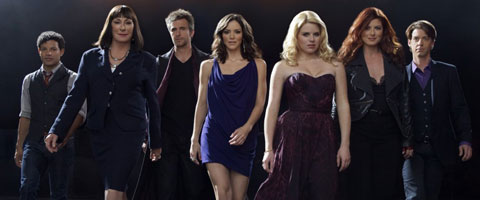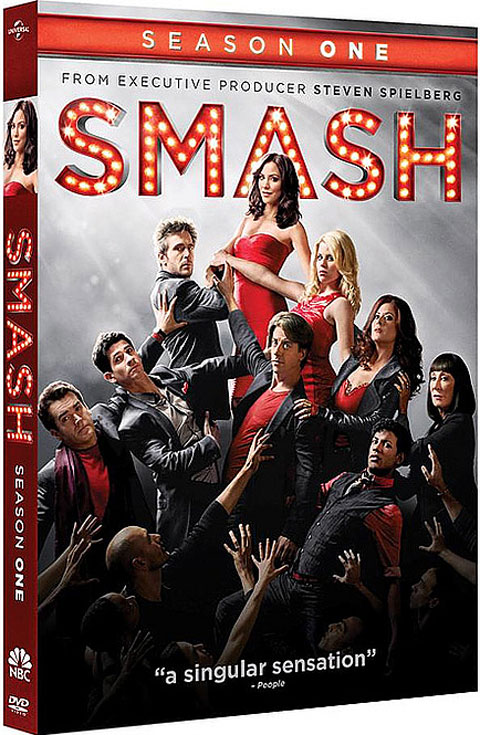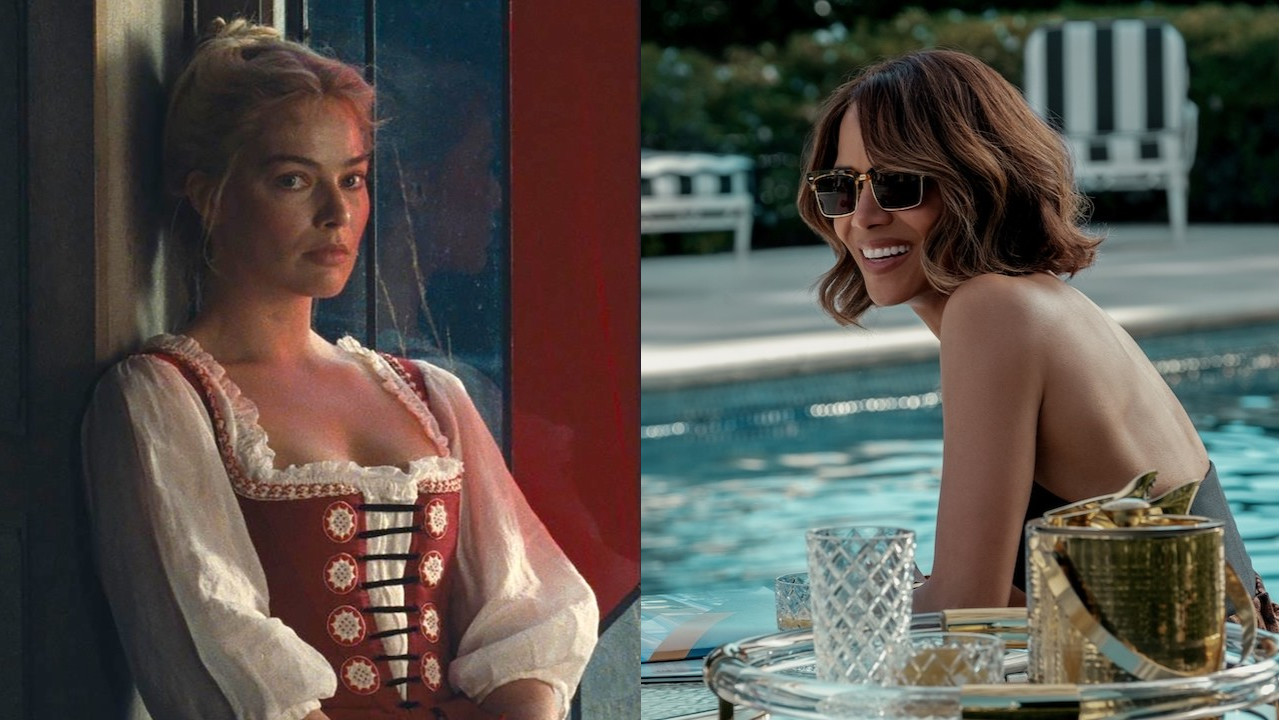Smash: Season 1 [DVD Review]

Your Daily Blend of Entertainment News
You are now subscribed
Your newsletter sign-up was successful
Smash is a great show in theory. The brainchild of Steven Spielberg, the hour-long drama was supposed to depict the development of a Broadway musical about Marilyn Monroe from the perspective of both its creators and the actresses vying for the lead. A talented ensemble cast, including Debra Messing and Angelica Huston, converges with catchy music from the songwriting team behind Hairspray and a frank depiction of the brutal New York theater machine. Unfortunately, in practice, the parts don't all work.
Some of the promise critics initially saw in Smash was a reflection of how very un-Glee it was. In place of hyperbolic teen drama, actresses like Karen (American Idol's Katharine McPhee) struggle with credit card bills and waitressing shifts, and hard-nosed producers like Eileen (Angelica Huston) haggle with unforthcoming investors. Instead of spontaneous hallway serenades, Smash’s early performances are part of a coherent, realistic audition structure. And where most of Glee’s young cast members only sing or dance (few can act), Smash’s ensemble is bursting with professional “triple threats” – performers who can sing, dance, and act – whose enthusiasm and talent make Smash’s most unexceptional numbers engaging.
Yet, as the season progresses, these flashes of brilliance are obscured by a tediously paced script that abandons its early focus on high stakes backstage deals for histrionic personal crises. Ivy (Rachel Hilty) lashes out in response to the pressures of her competition with Karen, as well as from her famous mother (guest star Bernadette Peters). Julia (Debra Messing), one half of a composer-lyricist team with Tom (Christian Borle), spends her time either soulfully gazing at her old flame (Will Chase) or crying in response to her family’s many arguments. Everyone spouts maudlin platitudes about how Marilyn’s tragic heroism applies to their plights. You would think all the teenage runaways, botched adoptions, and pill addictions would be at least mildly entertaining, but no. There’s little worse than bad melodrama, and Smash is soapy in the worst way possible.
Even the sparkle of the musical numbers is muddied by the surrounding dreck. The commitment to making the songs fit in the narrative go out the window in favor of numbers as outlandish as anything Glee has produced, from a pseudo-music video in Ivy’s bedroom to an extravagant Bollywood number and a song through which Karen (dressed as Marilyn) seduces her director in the rehearsal room. While there’s obviously nothing wrong with an unrealistic production number, these digressions do little to advance the plot, and only widen the gap between the world of the productions and that of the characters.
What little joy there is in the nonmusical sections comes from the actors’ triumphs over their dismal material. Borle and Messing are a delightful team, establishing the fond, trusting rapport of partners who have gone through hell together. Jack Davenport is a delightful villain as the musical’s director, in spite of the script’s insistence on making him not only verbally abusive, but kind-of a homophobe and sexual harasser to boot. Huston is lovely in her role as well, bringing a sense of Hollywood glamour and unshakeable authority to many battles of will.
Unfortunately, none of these actors is allowed as much screen time as Hilty and McPhee, whose acting skills are a far cry from their singing abilities. Hilty is one of those Broadway babies whose penchant for over-emoting is perfect on stage but overkill on screen. McPhee just can’t act. Her character is as bland as the state she comes from (sorry, Iowa), but even with so uncomplicated a role, she basically fills space while the other characters act around her. A musical can be memorable based solely on its songs, but with two such uninspiring leading ladies on top of its writing woes, it’s surprising that Smash is still afloat.
Some of Smash’s issues are illuminated by the wide array of extras on the DVD set, including deleted or extended scenes from every episode. Most of these scenes are often even slower or more inarticulate than the rest of the show. Others, however, contain crucial connecting information that should have made the final cut. In a deleted scene from the midseason finale, Tom’s boring boyfriend confronts Tom over their lack of chemistry, saying that Tom always puts the show first. It is a nice acknowledgement of the fact that their relationship seems to be going nowhere, and that they (and the show) are essentially wasting their time. Scenes such as this would easily fit in if the show would stop insisting on such long songs – most over three minutes, which is enough time for about five verses, and more than enough time for the audience to get bored. Once again, emphasizing the music is often a good call, but the rest of the episode has to be at least coherent for the show to work.
Your Daily Blend of Entertainment News
“A Dream Come True” discusses the development of Smash and how each of the main actors fits into the cast. It's about as useful as the gag reel; neither is really informative, but they’re pleasant nevertheless. “Song & Dance” discusses the process and perspective of the songwriting team (Marc Shaiman and Scott Wittman) as well as choreographer Joshua Bergasse. It’s telling that there is an entire segment applauding the strength of the dances and music, and another applauding the talent of the performers, yet no one comes close to even mentioning the writing. The show is clearly eager to sidestep any mention of their problems, lest they generate even more critical notes.
Over the course of its first season, Smash has mutated into its own worst nightmare: a show more artificial and unconvincing than Glee. A respectable audience will probably keep tuning in for the elaborate production numbers, whether the show reverts to its original concept or not. Without improvements on the nonmusical front, however, Smash should simply be re-titled Flop.
?Rating:

?
?
Length:650 Minutes
Distributor:Universal Studios
Release Date:January 8, 2013
Starring: Katharine McPhee, Megan Hilty, Debra Messing, Christian Borle, Jack Davenport
Directed by:Michael Mayer, Michael Morris
Created by:Theresa Rebeck

